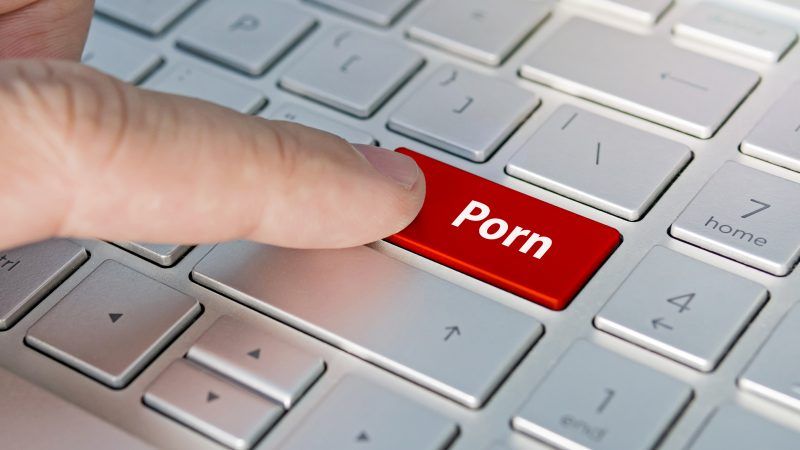Want the Government To 'Defend Families' From Porn? Child Protective Services Should Be a Cautionary Tale.
The new right naively thinks a government more empowered to "protect children" would be good for families. Nope.

In their zeal to break with libertarians and limited-government conservatives, various thinkers on the new right have been making a lot of noise about the allegedly urgent need to ban pornography.
Such a crackdown is being touted as pro-family and pro-child—part of a revitalized conservative agenda that thinks the government has an important role to play in promoting and defending families and children.
These conservatives should consider the track record of the government agencies most directly involved with ostensibly safeguarding the welfare of children: the states' various child protective services departments. I submit that think-of-the-children conservatives who grapple seriously with CPS's long history of tearing apart families for no good reason should shudder at the idea of giving more power to the state.
Let's consider the most recent article from Matt Walsh, a Daily Wire writer who has helped to revive and revisit this debate. Walsh is among a group of social conservatives—Sohrab Ahmari and Matthew Schmitz are two others—firmly in the camp that says conservatism should shed its libertarian side and fully embrace the government's power to promote social welfare. In an interview with Vox's Jane Coaston, Reason's Katherine Mangu-Ward described this view as "the idea that we should prohibit people from making bad choices," or more simply "make the bad thing illegal." In his various debates with conservative writer David French (who leans more toward the libertarian side, though he supports some efforts to curb pornography), Ahmari has repeatedly reminded audiences and readers that he is "willing to ban things."
Walsh defines his position thusly: "Every Child Exposed to Internet Pornography Is an Abuse Victim. There Should Be Laws Protecting Them." For the sake of argument, let's assume that the first part of that contains at least some truth, and that porn is indeed harmful for kids. (The harms of porn are generally overstated, but we'll ignore that for the moment.)
There is a government agency tasked with protecting children from abuse. This agency goes by a different name in every state; in California, for example, it's Child Protective Services, or CPS. It is empowered to remove children from homes where abuse is suspected.
Now, it is undoubtedly true that some children are in indeed vulnerable situations. But CPS is a hammer, and every family that comes under suspicion of having done something wrong is a nail. Here at Reason, Lenore Skenazy and I have chronicled many horror stories about these agencies' wrongful interventions. Diane Redleaf, an attorney, families advocate, and author of They Took the Kids Last Night: How Child Protective Services Puts Families At Risk, told Skenazy that "children are routinely taken from their parents, even when there's no evidence of abuse." They are taken because of a false accusation from a nosy neighbor or teacher, because perfectly capable children were left alone by themselves for short periods of time, because of injuries that the authorities wrongly attributed to abuse, because doctors' instructions weren't followed to a T, and for a host of other reasons that did not actually necessitate tearing families apart.
The Houston Chronicle recently conducted a massive survey of CPS victims. Some 300 parents told the paper that medical misunderstandings had resulted in them losing custody of their children. For more on this subject, read my report about the Lowther family, torn apart for half a year because of a false accusation of child sexual abuse.
I'm sure many pro-family conservatives react with horror when the government overrides parental rights in these cases. (Indeed, I recall that Walsh covered the Lowther case, for which I am grateful.) Do kids belong to themselves and their parents, or are they the property of the state? Should we default toward trusting parents to know what's best for their kids, or should they have to prove that they are better stewards of their own children's well-being than a vast government bureaucracy? I think it's obvious where social conservatives should stand on this.
Declaring that thousands of perfectly healthy young people are actually victims of sexual abuse because they consumed some pornography is a recipe for disaster. It's an invitation for the state to punish parents for having failed to prevent this abuse.
I understand that the aim of anti-pornography conservatives is not to punish parents but to help them, by going after porn creators and distributors. But other wars on vice—drugs, prostitution, alcohol, cigarettes—have virtually always been waged against the consumers of such vices as well as the producers and providers. Why would porn be any different?
When the state's responsibility for children increases—when every undesirable thing is considered a form of abuse necessitating governmental intervention—parents lose rights. Giving the government more opportunities to hassle families should have no place in a pro-family agenda.


Show Comments (78)